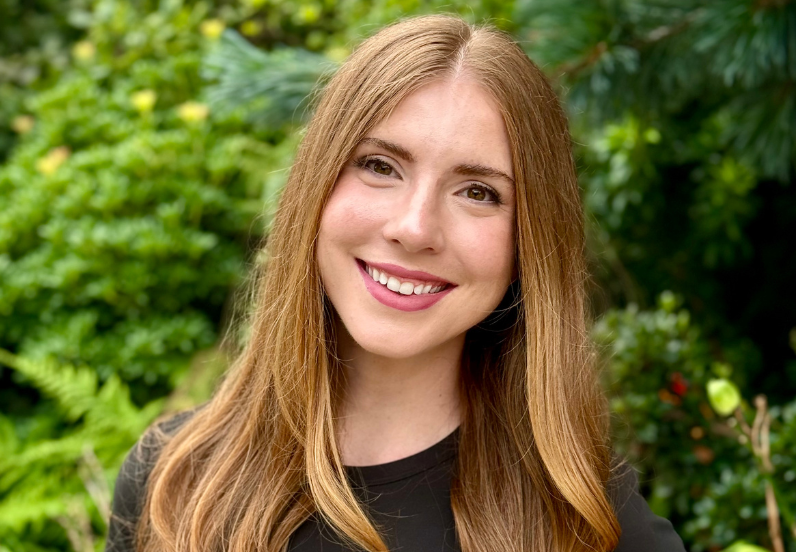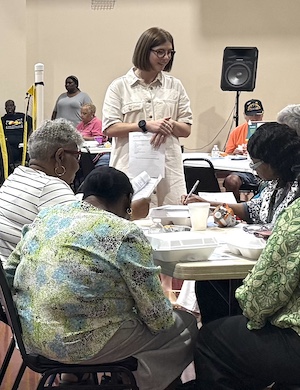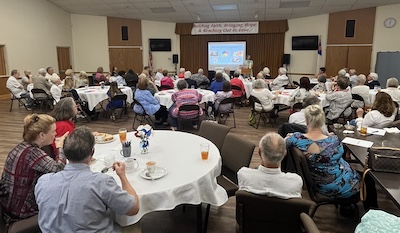
Caroline Nester Rooney, Ph.D., considers herself fortunate to have grown up among the lush green mountains and natural springs of Hot Springs, Arkansas, a close-knit community of 30,000. As an undergraduate at nearby Hendrix College, she struck good fortune again with a rare opportunity for someone from her area: An externship at an institute with the only two neuropsychologists in the state.
“I was the only undergraduate student in the entire state who would have had this exposure,” Nester Rooney said. “It completely changed my life.”
Since then, Nester Rooney has made good on that chance, pursuing ten years of specialized training in the Northeast to become a neuropsychologist. Now, as a postdoctoral fellow in the Postdoctoral Fellowship Training Program at Brown, she is using that expertise to benefit the Arkansan community where she spent her most formative years.
This past May, Nester Rooney returned to Hot Springs to lead a week-long series of workshops on healthy brain aging for older adults. She is building on that groundwork with several research projects focused on the neuropsychological needs of Arkansas’ older, rural population.
“Ultimately, I had to leave my home state to become a neuropsychologist,” Nester Rooney said. “That’s why it’s so meaningful to be able to give back. There’s such a need.”
The rates of dementia in Arkansas are about double those of the East Coast, Nester Rooney said, due in part to cardiovascular risk factors endemic to the so-called Stroke Belt of the southern United States. (Any damage to blood vessels or circulation can affect blood flow in the brain.) Compounding the problem is a lack of providers to diagnose and treat dementia. The Alzheimer’s Association has identified Arkansas as a “neurology desert.”
Nester Rooney saw the effects of limited medical care firsthand growing up. When her grandfather became sick with cancer, her grandmother Barbara Landes drove with him six hours to Dallas to seek specialized medical treatment. In fact, it was Landes who first realized the impact her granddaughter could make in their rural area. After attending Nester Rooney’s dissertation defense last year, which focused on the early diagnosis of dementia, Landes suggested that her friends in her church Bible school class would appreciate learning more about dementia, too.

“I said, ‘Gram, that’s the best idea ever,’” Nester Rooney recalled.
During the week of May 19-25, Nester Rooney gave presentations on healthy brain aging at her grandmother’s church, two local senior centers, and the county library. Her presentations – adapted from an educational program developed and piloted in Rhode Island by her mentors Jennifer Davis, Ph.D., and Laura Korthauer, Ph.D., both faculty in the Department of Psychiatry and Human Behavior – reviewed the normal brain aging process and red flags to discuss with a doctor, risk factors for dementia, and behavioral changes that can reduce that risk.
Over 300 people attended her talks – in other words, one percent of the population of Hot Springs. The enthusiastic turnout reflected the warm homecoming reception Nester Rooney received.
“I didn’t want to be perceived as someone coming down from my ivory tower,” she said. “This is the community that raised me.”
The science she shared with her community seemed to hit home. After hearing Nester Rooney speak, attendees were significantly more accurate in ranking risks to their brain health. A survey she distributed (completed by more than two-thirds of attendees) found that more than 90 percent reported they were confident they could improve their brain health and would take steps to do so.
Nester Rooney plans to write a paper on these results to illuminate the potential benefit of a one-time brain health education intervention in a rural, southern state.
“Rural, older adults are systematically under-researched and under-included in any kind of aging study,” she said. “Part of my mission is to try to address that.”

Nester Rooney is planning a number of other research studies focused on that population. In one, she will be conducting qualitative interviews with physicians to learn what dementia-related needs they’re seeing among their rural patients. In another, she is collaborating with Lee Isaac, Psy.D., the only neuropsychologist in Arkansas who specializes in aging, to study an online cognitive assessment that people in rural areas can take at home. They hope that given these patients’ limited access to in-person testing with a neuropsychologist, a digital approximation might be able to catch more symptoms earlier.
Nester Rooney hopes her work in Arkansas is only the beginning of a longer, lifelong undertaking to apply her neuropsychology training to her rural roots.
“The job market is very tough given the state of the National Institutes of Health,” she said. “But my passion is to continue to pursue this research, to continue to work with more rural populations, and increase accessibility to brain healthcare.”